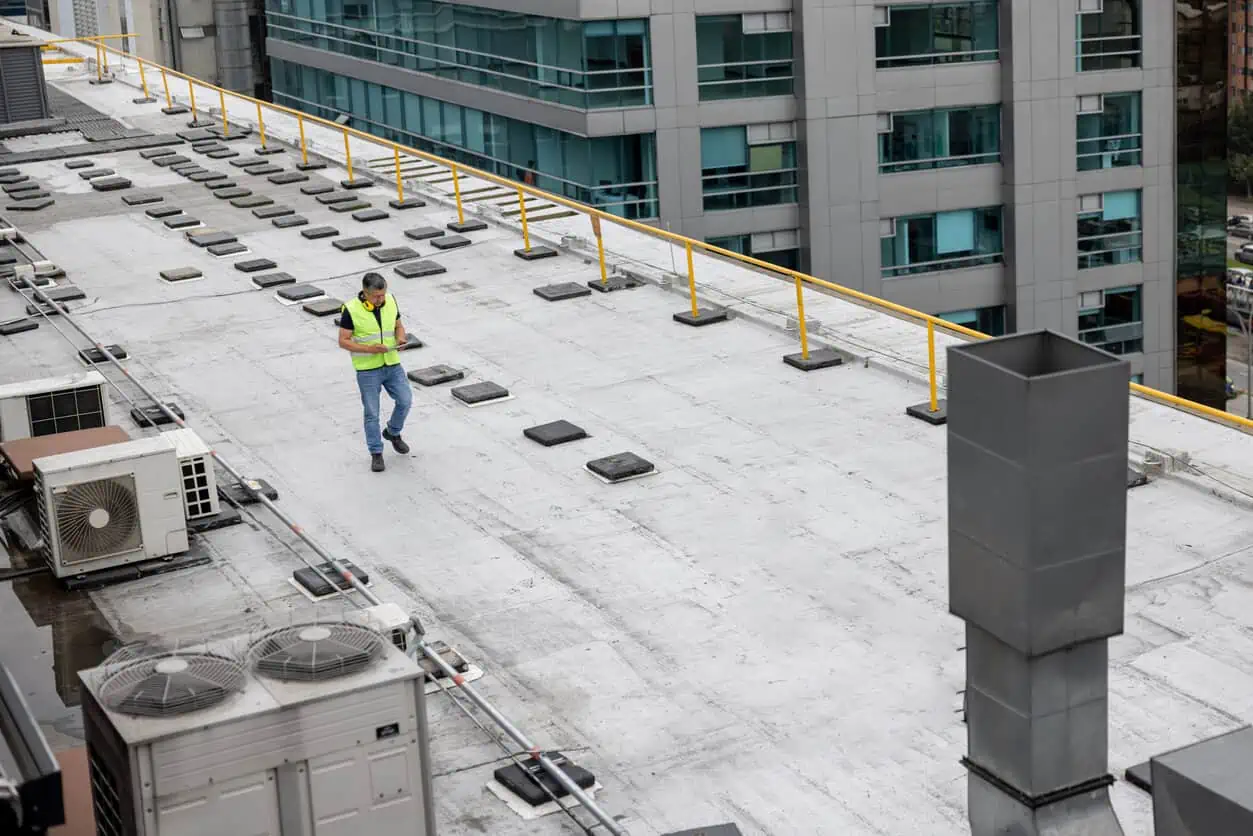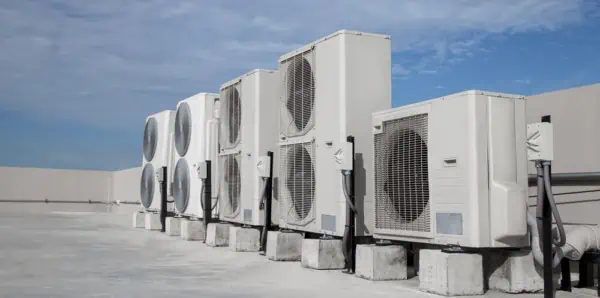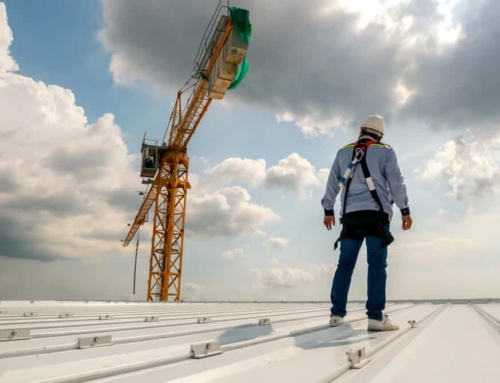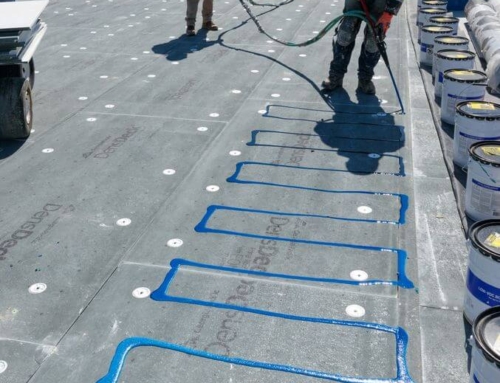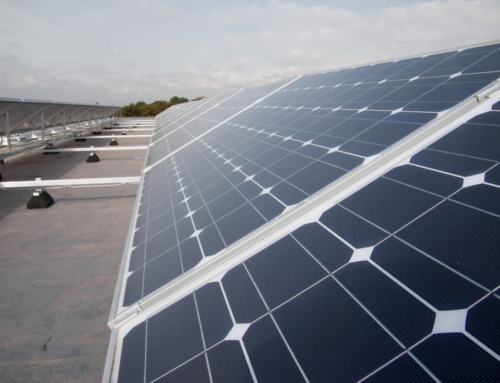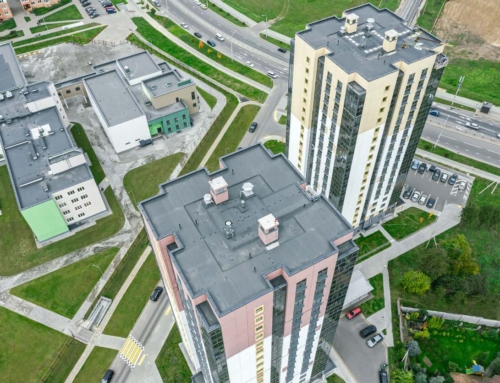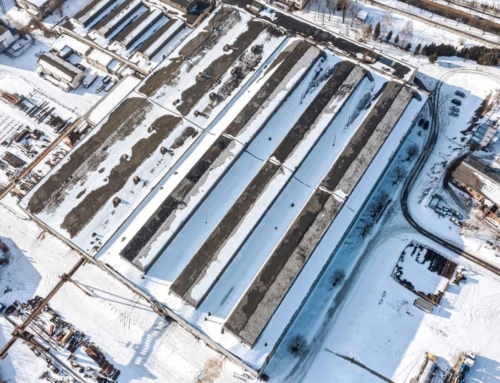Commercial roofing system maintenance is essential for preserving the integrity of the roof material of a building and protecting its occupants, equipment, and inventory. Here are some best practices and preventive strategies for commercial roof maintenance.
Contents
- 1 Commercial Roofing System Maintenance Strategies
- 1.1 Complete regular inspections
- 1.2 Clear debris
- 1.3 Maintain drainage systems
- 1.4 Address vegetation growth
- 1.5 Inspect flashings and sealants
- 1.6
- 1.7 Repair leaks promptly
- 1.8 Protect the commercial roof membrane
- 1.9 Maintain rooftop HVAC units
- 1.10 Reduce roof traffic
- 1.11 Document maintenance records
- 1.12 Plan for seasonal maintenance
- 2 Key Takeaways About Commercial Roof Maintenance
Commercial Roofing System Maintenance Strategies
Regular roof maintenance is critical for any type of commercial roof system. Seek the help of a professional roofing contractor to ensure your low-slope or steep-slope roof on your commercial building is performing as it should.
Here’s how to maintain your commercial roof with the help of professionals.
Complete regular inspections
Conduct routine inspections of the roof throughout the year and after severe weather events. Look for signs of damage in the forms of:
- Cracks
- Punctures
- Blistering
- Deterioration
Of course, schedule periodic inspections with a commercial roofing company. The professionals can safely identify current damage and issues that may be exacerbated over time.
Clear debris
Regularly remove debris, such as leaves, branches, and trash, from the roof surface and gutters. Accumulated debris can clog drains and cause water pooling, leading to roof damage and leaks.
Maintain drainage systems
Ensure that roof drains, gutters, and downspouts are clear of obstructions and functioning correctly to prevent water buildup and ponding on the roof surface.
Address vegetation growth
Trim overhanging branches and vegetation near the roof to prevent damage from falling limbs and reduce the risk of mold or algae growth on the roof surface.
Inspect flashings and sealants
Have a roofing professional check the condition of flashings, sealants, and caulking around penetrations, edges, and seams. Repair or replace any damaged or deteriorated flashing to maintain watertight seals.
Repair leaks promptly
Have a professional address roof leaks as soon as they are discovered to prevent further deterioration and damage to the building’s interior and structural components. Conduct a thorough investigation to identify the source of the leak and repair it effectively.
Protect the commercial roof membrane
Apply a protective coating or membrane to the roof surface to enhance durability, waterproofing, and UV resistance. These coatings can be applied to many types of roofs (metal roof, BURs, modified bitumen, etc.) and extend the lifespan and energy efficiency of the roofing system.
Maintain rooftop HVAC units
Maintain the HVAC unit’s rooftop equipment to prevent leaks caused by improper installation, condensation, or mechanical damage from equipment vibrations.
Reduce roof traffic
Minimize foot traffic on the roof to reduce the risk of damage to roofing materials and membranes. Establish designated walkways or access points and train personnel accessing the roof to avoid unnecessary damage.
Document maintenance records
Keep detailed records of the following:
- Roof inspections
- Repairs
- Maintenance activities
- Warranty information
Maintaining comprehensive documentation helps track the roof’s condition over time and facilitates warranty claims or future maintenance planning.
Plan for seasonal maintenance
Adjust maintenance activities based on seasonal changes and weather patterns. Perform additional professional inspections and preventive maintenance tasks before the onset of severe weather, such as heavy rain, snow, or high winds.
By implementing these best practices and preventive strategies, commercial property owners can do the following:
- Increase the amount of time before the next roof replacement project.
- Minimize the risk of costly repairs.
- Ensure the continued functionality and safety of their buildings.
Regular maintenance and proactive management are crucial to preserving the integrity of commercial roofing systems.
Nations Roof is your trusted commercial roofing partner. We will help you develop a proactive maintenance plan for all your commercial buildings. Prolong the life of your commercial roofs by partnering with Nations Roof.
Key Takeaways About Commercial Roof Maintenance
- Complete regular inspections.
- Clear debris.
- Maintain drainage systems.
- Address vegetation growth.
- Inspect flashings and sealants.
- Repair leaks promptly.
- Protect the commercial roof membrane.
- Maintain rooftop HVAC units.
- Reduce roof traffic.
- Document maintenance records.
- Plan for seasonal maintenance.

